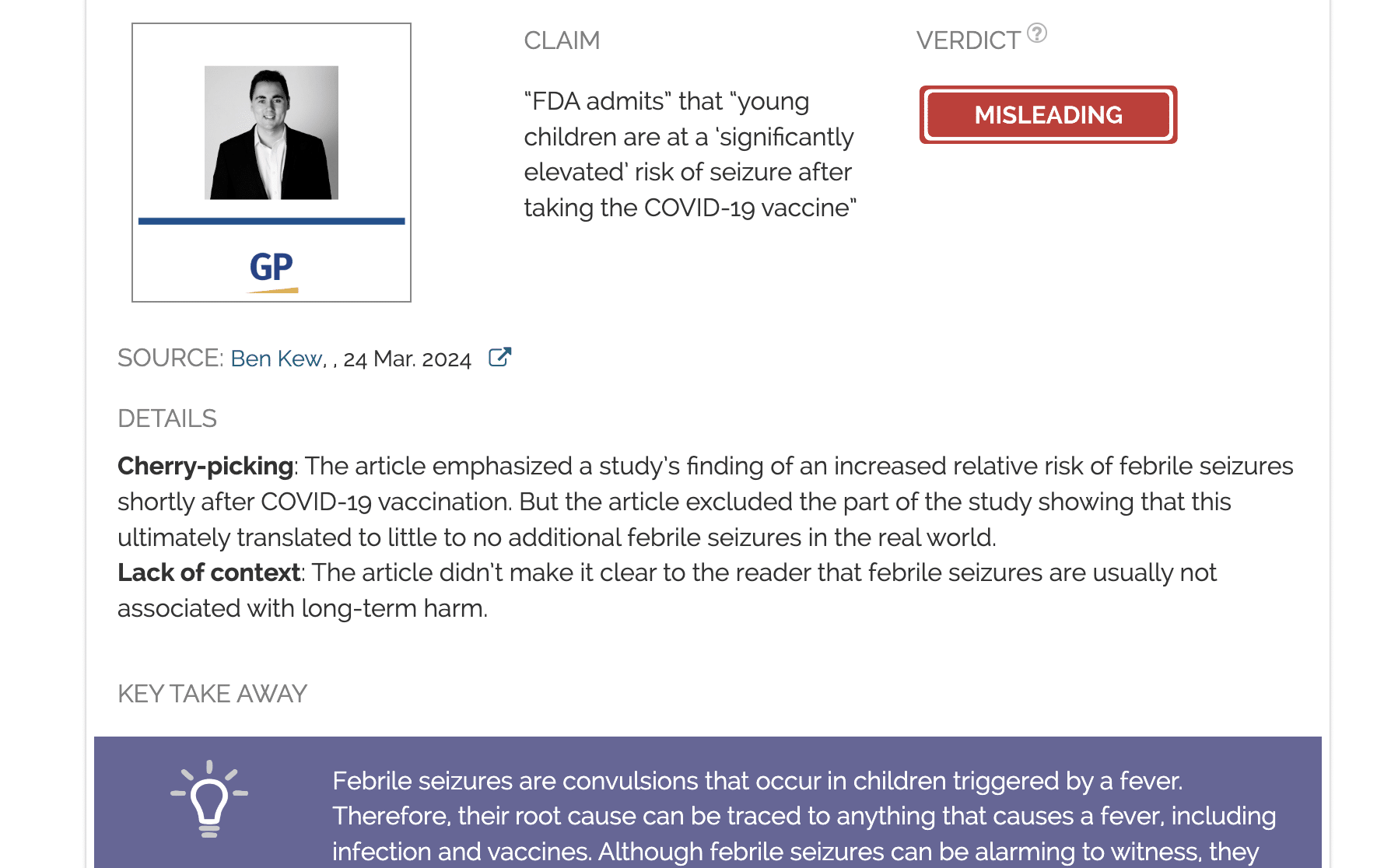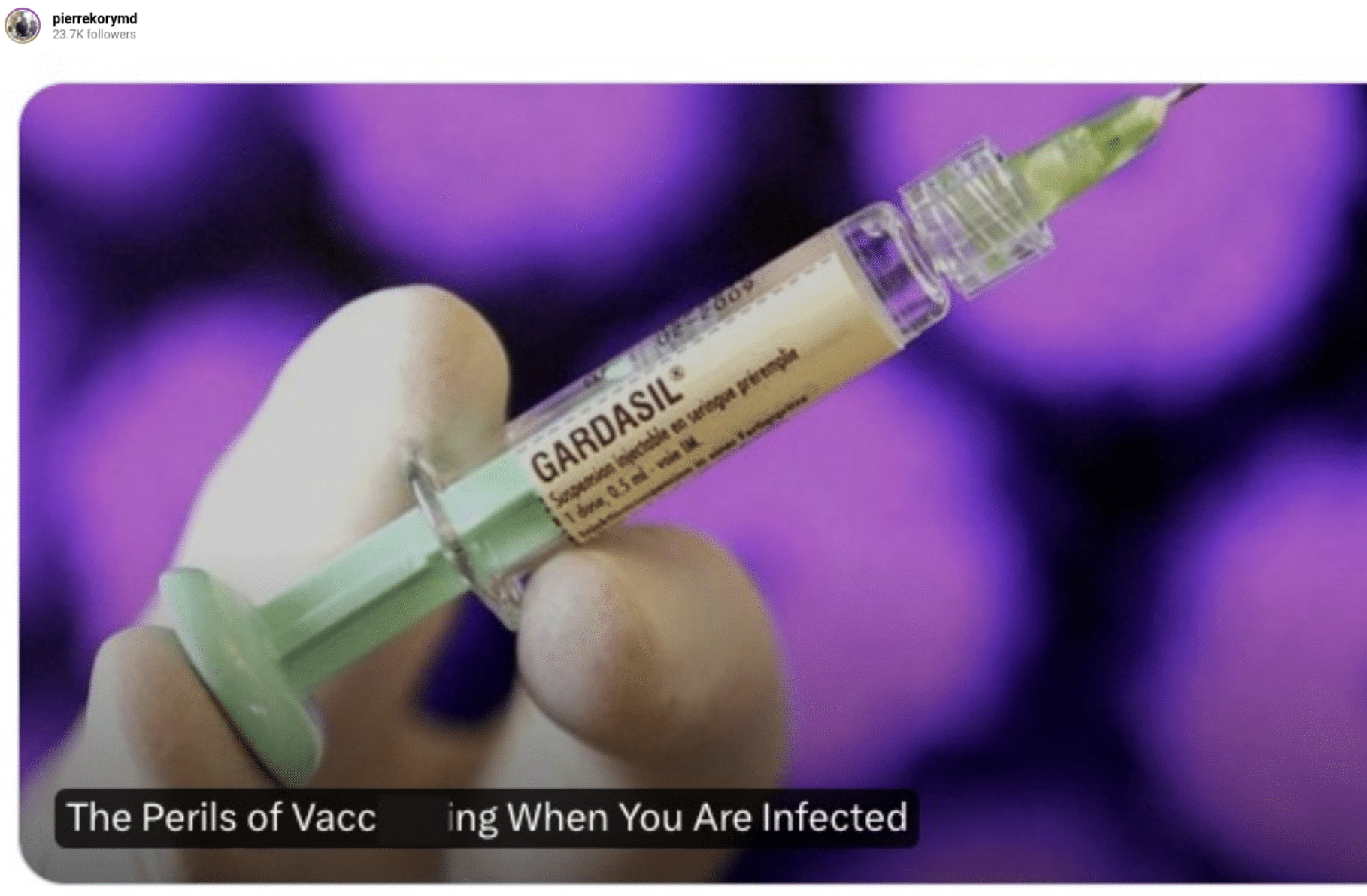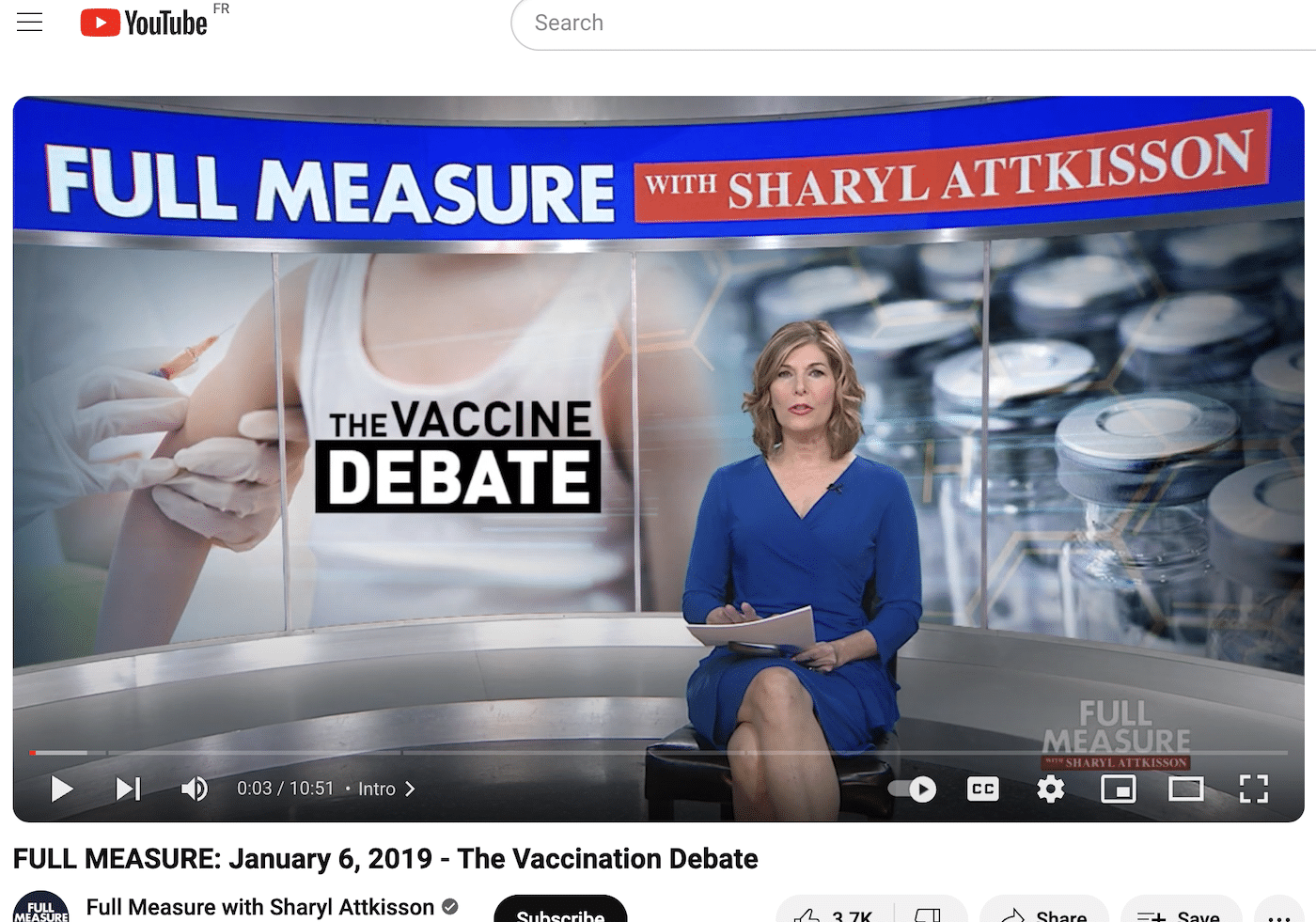- Health
Approved COVID-19 vaccines don’t contain HIV proteins and don’t cause AIDS, contrary to claim misquoting BBC documentary
Key takeaway
The main benefit of COVID-19 vaccines is in reducing the risk of severe disease. They are also safe and the evidence indicates that they aren’t associated with increased all-cause mortality. Furthermore, they limit SARS-CoV-2 transmission, although their effectiveness in this regard varies depending on the SARS-CoV-2 variant and the amount of time elapsed since vaccination.
Reviewed content

Verdict:
Claim:
COVID-19 vaccines contain proteins from HIV; “if you have taken the third dose, go and take a test for AIDS, then sue your government”
Verdict detail
Misleading: The claim misleads viewers into believing that the COVID-19 vaccines available to the public contain a HIV protein fragment, which is false. Although a vaccine candidate presented in the BBC documentary contained a HIV protein fragment, this candidate didn’t make it past clinical trials.
Incorrect: The claim implies that COVID-19 vaccines cause AIDS. This cannot occur, since the COVID-19 vaccines don’t contain HIV, the virus responsible for causing AIDS.
Full Claim
COVID-19 vaccines contain proteins from HIV; “if you have taken the third dose, go and take a test for AIDS, then sue your government”; “Why was this kept from…You??”
Review
The claim that COVID-19 vaccines cause acquired immunodeficiency syndrome (AIDS) because they contain proteins from the human immunodeficiency virus (HIV)—the virus responsible for AIDS—circulated on social media in December 2023. This claim already appeared in October 2023, and an analysis from Reuters found it inaccurate.
The December 2023 version of this claim appeared in a Facebook reel containing an excerpt from a BBC documentary featuring Keith Chappell, a molecular virologist at the University of Queensland, Australia.
In the excerpt, Chappell presented the concept of a “molecular clamp”[1] that he and his team attempted to use in a COVID-19 vaccine. The clamp is actually a tiny fragment of a protein called gp41, which is present in HIV, that researchers fused to the spike protein of SARS-CoV-2 in the lab. The BBC documentary explained that adding the gp41-derived molecular clamp helps to lock the spike protein into a shape best suited to activate an immune response. Thus, a vaccine using the Spike protein fused to the molecular clamp would produce an efficient immune response in the body, because the Spike protein is always presented in the shape most likely to generate an immune reaction.
The reel then cut to the question, “Why was this kept from…You??” and to a statement by virologist Luc Montagnier saying “if you have taken the third dose, go and take a test for AIDS, then sue your government”. Montagnier propagated disinformation against vaccines and COVID-19 on numerous occasions.
Taken together, the claim thus implied that, unbeknownst to the public, the COVID-19 vaccines administered to the public contained the HIV fragment described by Chappell and caused AIDS among the recipients. This, however, is inaccurate on several levels.
First, one fragment of a HIV protein isn’t enough to cause AIDS. This is because it takes the entire HIV virus for the virus to replicate and infect and destroy the immune cells, which is what happens in the disease.
Chappell’s molecular clamp uses a fragment from the HIV protein called gp41 that is necessary for HIV to enter and infect the cells[2]. However, Chappell’s vaccine candidate doesn’t contain HIV itself. Without live HIV viral particles, the vaccine cannot cause AIDS.
Second, Chappell’s vaccine candidate wasn’t available to the general public. While the results from Phase I clinical trial showed that the vaccine elicited a strong immune response, the vaccine candidate didn’t clear Phase I because it could produce false-positive HIV test results[3].
The reason for this is that the molecular clamp was derived from a HIV protein and so could confuse HIV diagnostic tests. Similar to COVID-19 diagnostic tests, HIV diagnostic tests work by detecting the presence of HIV proteins or RNA in the body. Thus, it is possible that the fragment from HIV gp41 in the vaccine could be detected by the diagnostic test and yield a positive result, even though the individual isn’t infected by HIV.
The majority of people in the U.S. and EU received the Pfizer-BioNTech and Moderna mRNA COVID-19 vaccines or adenoviral vector vaccines from AstraZeneca and Johnson & Johnson. None of them contain HIV proteins.
Last, the mRNA and adenoviral vaccines cited above don’t cause AIDS nor any other kind of immunodeficiency, as Health Feedback documented many times. Such claims usually stem from comparison of all-cause mortality between vaccinated and unvaccinated people, without taking into account any possible differences between groups that might interfere with mortality, such as age, comorbidity, health seeking behavior, among others.
There is no evidence that people vaccinated against COVID-19 are more susceptible to other infectious diseases. Furthermore, multiple published studies showed that unvaccinated people have a higher all-cause mortality than vaccinated individuals[4-6].
REFERENCES
- 1 – Wijesundara et al. (2020) Rapid Response Subunit Vaccine Design in the Absence of Structural Information. Frontiers in immunology.
- 2 – Wilen et al. (2012) HIV: Cell Binding and Entry. Cold Spring Harbor Perspectives in Medicine.
- 3 – Chappell et al. (2021) Safety and immunogenicity of an MF59-adjuvanted spike glycoprotein-clamp vaccine for SARS-CoV-2: a randomised, double-blind, placebo-controlled, phase 1 trial. The Lancet infectious diseases.
- 4 – Xu et al. (2023) A safety study evaluating non-COVID-19 mortality risk following COVID-19 vaccination. Vaccine.
- 5 – Tu et al. (2023) SARS-CoV-2 Infection, Hospitalization, and Death in Vaccinated and Infected Individuals by Age Groups in Indiana, 2021‒2022. American Journal of Public Health.
- 6 – Pálinkás and Sándor (2022) Effectiveness of COVID-19 Vaccination in Preventing All-Cause Mortality among Adults during the Third Wave of the Epidemic in Hungary: Nationwide Retrospective Cohort Study. Vaccines.



